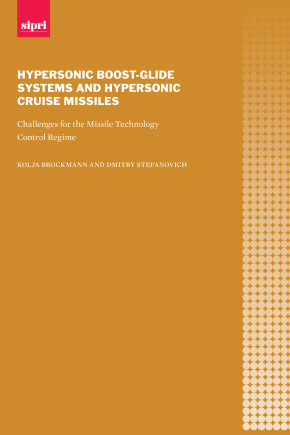Hypersonic Boost-glide Systems and Hypersonic Cruise Missiles: Challenges for the Missile Technology Control Regime
An increasing number of states are pursuing hypersonic missile development programmes, including for hypersonic boost-glide systems and hypersonic cruise missiles. Hypersonic missiles combine hypersonic speed and manoeuvrability, which can result in target ambiguity, render missile defences ineffective and reduce warning times. Some hypersonic missiles are developed as delivery systems both for nuclear and conventional payloads. The combination of these capabilities may have escalatory or destabilizing effects.
The Missile Technology Control Regime (MTCR) is the main instrument through which states seek to harmonize export control policies to govern the transfer of missile technology. It is key to ensure that the MTCR’s guidelines and control list adequately cover hypersonic missiles and related goods and technologies. This paper seeks to improve the understanding of hypersonic missiles, increase awareness among policymakers and export control officials, and inform the ongoing technical and policy discussions within the MTCR to strengthen efforts to limit the proliferation of hypersonic missiles.
1. Introduction
2. Hypersonic boost-glide systems and hypersonic cruise missiles
3. Conventional–nuclear entanglement and MTCR controls on dual-capable delivery systems
4. Applying MTCR export controls to hypersonic boost-glide systems and hypersonic cruise missiles
5. Recommendations


